Home Office spent £35k on ads to deter small boat migrants - but targeted tourists instead
Exclusive: Adverts told people ‘don’t risk your life’ and ‘seek asylum in the first safe country you reach’
The Home Office spent at least £35,000 on “fear-based” social media adverts that intended to deter asylum seekers crossing the Channel in small boats, but instead targeted tourists and business travellers.
The Facebook and Instagram campaign, repeated in several languages, told people “don’t risk your life” and “seek asylum in the first safe country you reach”. But the government has no way of telling if they reached the right people or had any effect.
Research seen by The Independent shows that the Home Office paid Meta - Facebook’s parent company – for hundreds of posts shown to people in parts of northern France and Belgium between January 2021 and September 2022.
Targets were primarily selected by language, including Arabic, Kurdish and Persian, and by “interests” including Afghan football and cricket, various Syrian cities, Iranian cinema, “Iraqi cuisine” and Vietnamese radio stations.
Some adverts were sent to people where online data suggested they were away from their homes or families, but others were shown to Facebook and Instagram users who live and work around Brussels, Calais and Dunkirk.
University of Edinburgh lecturer Ben Collier, who conducted the research, said the government had created “weird patchwork profiles” that could result in the adverts reaching asylum seekers – but also caught a lot of other people.
“There’s people from Jordan, Mexico – clearly holidaymakers who are getting hit with these ads,” he said.
“As far as I can tell, the Home Office are just throwing stuff at the wall and seeing what sticks, except they don't have anything to tell them.”
Data viewed by The Independent shows that some adverts reached fewer than 1,000 people, while others reached over a million.
One targeted Arabic speakers aged over 18 who had recently been in Brussels, while others were aimed at smaller groups, such as Vietnamese people travelling away from family in Calais, and Arabic speakers who had just left Brussels with interests in Afghan sport.
Calculations using the lowest estimates of Meta’s advertising spending data showed the posts cost at least £35,000.

Dr Collier said the campaign was part of a wider “nudge approach” aiming to influence behaviour, which had become increasingly “fear-based and nastier” from the Home Office in recent years.
Messages repeated in several languages told people: “Even if you survive an illegal boat trip, UK laws will not allow you to work or earn money.”
Researchers studied data showing where the adverts appeared on people’s feeds and pages and found that some were seen as far away as Mexico, Jordan, Oman and Bangladesh – “clearly hitting an unintended audience of holidaymakers or business travellers”.
Most of the adverts were removed from Facebook and Instagram after a matter of weeks in 2022, because they did not contain the disclaimers required for political messaging.
A report by the Scottish Institute for Policing Research said: “There is clear evidence that [the campaign] has been seen by Arabic, Pashto, Vietnamese, and Albanian speakers in a number of locations who are extremely unlikely to be seeking asylum.
“This means that, for example, in Brussels, there are Arabic-speaking residents who will be targeted by this advert, when their French-speaking neighbours will not see it.”
The report, which also covered social media targeting by law enforcement bodies, accused the Home Office of engaging in “the invasive targeting of extremely vulnerable refugees”.
“The adverts explicitly use a fear-based approach, including graphic depictions of boats sinking at sea, dogs searching trucks, and military-style drones,” it said.

“This includes asserting that they will be considered a people smuggler and imprisoned if they help steer the boat, that they will be betrayed by people smugglers, that they are likely to die in the Channel, and that drones and dogs will be used to find them.”
Part of the campaign was run under a contract for private company Seefar, which The Independent previously revealed had been paid at least £2.7m of public money since 2016.
Projects listed included “France migrant comms” and “overseas communications”, which were linked to a website accused of masquerading as a non-partisan charity.
Dr Collier said the data used in the attempted targeting of potential small boat migrants was “very intimate” and had been “picked up by the platform spying on these people as they go around on the internet”.
But he said that Meta was the only tech giant to release detailed information on the tactic, warning: “So much of this stuff is going on Google search and Twitter, Snapchat and TikTok as well, and we just can't see what's being done.
“This is just a tiny snapshot of government use of these types of campaigns.”
The Home Office has been approached for comment.
Join our commenting forum
Join thought-provoking conversations, follow other Independent readers and see their replies
Comments





Bookmark popover
Removed from bookmarks